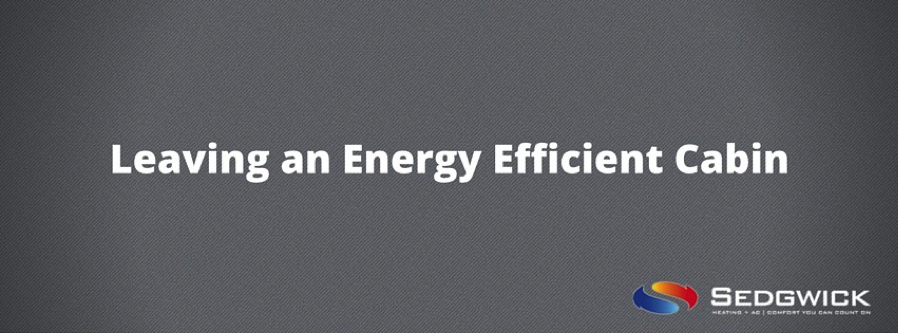How to Winterize a Cabin in Minnesota

Minnesota’s weather can be extreme — sweltering summers that drive you to the lake and bone-chilling winters that demand serious preparation. If you’re one of many Minnesota cabin owners, it’s not just about enjoying the summer sun; it’s about getting ready for the long, harsh winter too.
Knowing how to winterize a cabin in Minnesota is essential to protect your investment, prevent damage and keep everything running smoothly. Whether you’re planning to spend time away or just want to ensure your cabin stays energy efficient year round, here’s a guide (and checklist) to help you winterize like a pro.
Do I Need to Winterize My Cabin?
Yes, winterizing your cabin is essential — especially in Minnesota where the winters are long and frigid. Failure to prepare can lead to costly damage from freezing pipes, energy waste and long-term wear on your cabin’s structure. Winterizing ensures that your cabin stays energy efficient and ready for your return when the weather warms up again.
What Does Winterizing a Cabin Mean?
Winterizing a cabin means preparing it for cold temperatures and periods of non-use. This process involves protecting plumbing, heating and electrical systems from freezing or malfunctioning as well as taking steps to conserve energy while the cabin is vacant. By properly winterizing, you reduce the risk of damage and ensure your cabin is safe and efficient throughout the year — not just when you’re using it.
How Do You Winterize a Cabin?
Winterizing a cabin involves taking several strategic steps to protect it from the harsh elements. Here’s a quick checklist to guide you through the process of winterizing a cabin in Minnesota:
- Adjust the Thermostat. Even when you’re not around, your HVAC system plays a critical role in preventing your cabin from falling victim to freezing temperatures. Set the thermostat to around 55°F — this will keep your cabin from freezing without using unnecessary energy. Installing a programmable thermostat can give you control from afar, allowing you to adjust settings without being on-site.
- Lower the Water Heater Temperature. If you’re leaving for the winter, turn your water heater to its lowest setting, or use “vacation mode” if available. This prevents energy waste while ensuring the water heater is ready when you return. For an extended leave, consider draining the water heater entirely to prevent any risk of freezing.
- Shut Off the Water Supply. The most important step in preventing costly damage is to shut off the exterior water supply and drain the plumbing system. This prevents frozen pipes from bursting — and causing misery — during the coldest months.
- Unplug Electronics. Even when powered off, electronics drain power. Unplug all non-essential devices before you leave to avoid unnecessary energy consumption.
- Use Insulation and Shades. Insulate any areas where cold air can seep in. This includes doors, windows and attics. Close blinds and curtains to help retain heat inside. If your cabin has reflective blinds or drapes, those can help reduce heat loss, too!
- Check the HVAC System. Before winter, it’s a good idea to service your cabin’s HVAC system. Make sure the furnace is in good working order and replace filters to ensure it runs efficiently. This step not only prolongs the life of your system but keeps your cabin at a safe temperature during the winter months.
How to Winterize Cabin Plumbing
Winterizing the plumbing in your cabin is one of the most crucial steps to avoid costly repairs. Here’s how you can do it:
- Shut Off the Main Water Supply: Turn off the water at the main valve to prevent any new water from entering the system while you’re not there to keep an eye on it.
- Drain All Water Lines: Open all faucets and drain water from sinks, toilets and showers. Flush the toilets to empty the tank and bowl. Don’t forget about appliances like humidifiers, dishwashers, freezers and washing machines.
- Use Antifreeze. Pour non-toxic RV antifreeze into drains, toilets and sinks to prevent any remaining water from freezing in the pipes. Follow manufacturer instructions for proper usage.
- Insulate Exposed Pipes. If any pipes run through unheated areas, consider insulating them to prevent freezing. Heat tape can also be a good option for particularly vulnerable sections.
Extra Tip: HVAC Services for Year-Round Comfort
Your HVAC system is key to maintaining your cabin’s comfort, even during off-season. Whether you’re getting ready for winter or preparing for summer, regular maintenance can keep your system running smoothly.
Consider scheduling an HVAC tune-up before you leave to ensure everything is in top shape. Sedgwick’s expert technicians can help you set up programmable thermostats or recommend energy-efficient systems to save you money year-round — all you have to do is give us a call!